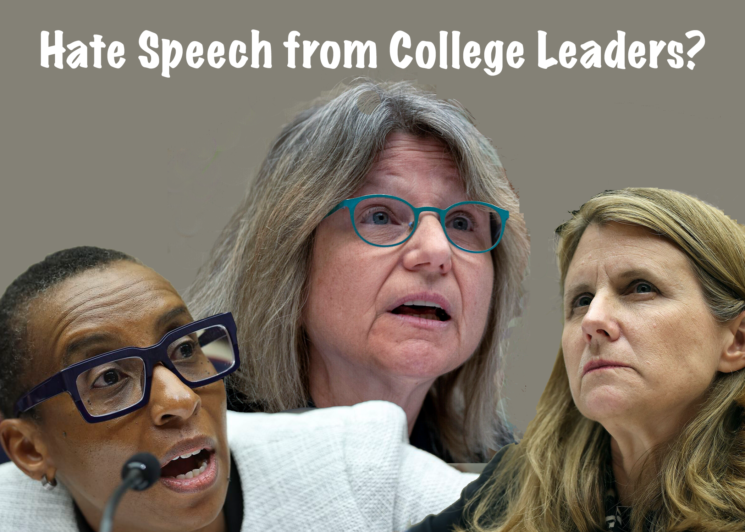
By Lauren Hyland
December 6, 2023, marked a critical moment in the ongoing discourse around free speech and its boundaries in educational institutions. The heads of three prestigious United States colleges faced widespread backlash and controversy after refusing to categorize calls for the genocide of Jews as harassment. The incident sparked heated debates about the limits of free expression, responsibility within academic spaces and the moral obligations of institutional leaders.
The controversy erupted during a congressional hearing on campus hate speech at a United States House of Representatives conference, where the university presidents of Harvard University, Massachusetts Institute of Technology and University of Pennsylvania were asked about their institutions’ approach to handling extreme and offensive language directed at specific ethnic or religious groups.
Elise Stefanik, an American politician serving as the U.S. Representative for New York’s 21st congressional district, attended this congressional hearing to question the previously mentioned college presidents.
“Does calling for the genocide of Jews [violate the colleges’] rules or code of conduct?” New York Representative Elise Stefanik asked.
The response of each president referenced the need for context of the situation.
The response from Penn president Liz Magill sparked immediate frustration from Stefanik who claimed this was the easiest question to answer yes to. “It is a context-dependent decision,” Magill answered.
“It can be depending on the context.” Harvard president Claudine Gay said, responding to the same question.
Stefanik continued the question to Massachusetts Institute of Technology president, Sally Kornbluth. If pervasive or severe, such speech would be “investigated as harassment,” Kornbluth said.
Shock riddled many in attendance and provoked an immediate outcry, the leaders of three prominent universities failed to condemn explicitly the incitement of genocide against Jews. However, it is also understood that their responses were affected by their institution’s rules on opposing hate speech.
They defended their institutions’ commitment to protecting free speech, asserting that any form of expression should be allowed within the confines of academic freedom. They are largely correct if said institutions model their policies after the confinements of the First Amendment. The First Amendment broadly safeguards expressions advocating violence, as affirmed by numerous Supreme Court rulings. Unless there is a concrete, imminent threat, such as direct provoking towards violence, the government is excluded from penalizing individuals endorsing violent ideas. It’s important to note that there is no exception to establishing this legal principle for cases involving genocide.
Their remarks immediately ignited a firestorm of criticism from various quarters, including students, faculty members, advocacy groups and political leaders. Many denounced the college heads’ stance as morally reprehensible and a failure to grasp the gravity of hate speech, particularly language that incites violence or threatens the safety of specific communities.
One prevailing argument against the leaders’ position was that while academic freedom and free speech are fundamental principles, they do not grant immunity to the harassment of specific groups or specifically calls for genocide. Critics argued that these leaders missed a critical opportunity to affirm the values of inclusivity, respect and safety for all students and failed to acknowledge the line where free speech transgresses into the realm of harmful and dangerous rhetoric.
The controversy reignited discussions on the responsibilities of university leadership and the need for clearer, ethically sound guidelines on addressing hate speech and extremist ideologies within educational settings. Many advocated for a more nuanced approach that upholds free expression while unequivocally condemning language that promotes violence or threatens marginalized groups.
In response to the public outcry, various university faculties, student bodies and alumni associations issued statements denouncing the college heads’ remarks and calling for reevaluating institutional policies on hate speech and discrimination. Calls for the resignation or removal of these leaders surfaced across social media platforms, intensifying the pressure on the universities to address the issue promptly and decisively. Republican-led House Committee on Education and the Workforce launched an investigation into campus safety at the three colleges and donors withheld previously aligned funds including a previously promised $100 million to Penn.
On Dec. 8, 2023, the following Friday after the congressional hearing, Gay apologized for her testimony and made it known that she hoped to combat antisemitism at Harvard. Similarly, Magill responded to the backlash by discussing the regret of her testimony and identifying limitations put on her.
“In that moment, I was focused on our university’s longstanding policies aligned with the US Constitution, which say that speech alone is not punishable. I was not focused on, but I should have been, the irrefutable fact that a call for genocide of Jewish people is a call for some of the most terrible violence human beings can perpetrate,” Magill said in a released video apology.
Following their apologies, Gay and Magill resigned from their positions. Kornbluth did not follow their actions.
As the debate rages on, it remains a question if this incident will prompt a broader reconsideration of policies regarding hate speech and the responsibilities of academic leaders in upholding ethical standards within their institutions.





